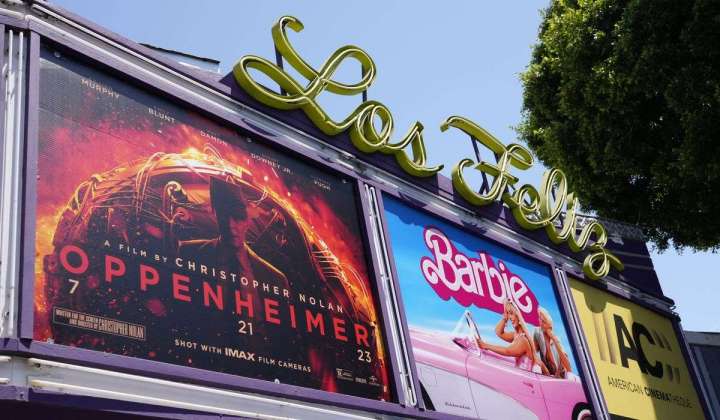Jokey ‘Barbenheimer’ references offend a conflicted Japan

SEOUL, South Korea — As U.S. audiences flock to summer blockbusters “Barbie” and “Oppenheimer,” memes that conflate the two movies have caused angst in Japan, the only nation on earth to suffer atomic bombings.
With Hollywood hammered by the long aftermath of COVID-19 and the writers’ strike, studio executives are reportedly delighted at the huge audiences pouring into cinemas to watch the two box-office hits, with fans often taking in both films in a single sitting.
But the “Barbenheimer” craze is playing very differently for Japan. Many have taken to social media to say that they are not amused by the trend, which includes images of laughing Barbie and Ken faces superimposed onto fiery atomic explosions.
The idea of pairing a lighthearted fantasy about an American doll with one of the grimmest moments in Japanese history is rubbing many the wrong way.
“Nuclear weapons aren’t cool,” one poster wrote of the ad campaign promoting the two movies as a package.
Warner Bros. Japan LLC, the distributor of “Barbie” in the country, complained in a statement about messages posted by the studio’s U.S. headquarters. The messages, which positively referenced the Barbenheimer memes, “lack consideration” and are “very regrettable,” the Kyodo news service reported.
According to new entertainment news site Deadline, Warner Bros. Film Group responded, saying, “Warner Brothers regrets its recent insensitive social media engagement. The studio offers a sincere apology.”
While “Barbie” is reportedly set to open in Japan on Aug. 11, there is — as yet — no release date set for “Oppenheimer,” which tracks the life story of the American physicist who headed the effort during World War II to build the first atomic bombs.
Time sensitivities, conflicted remembrances
An August release in Japan could prove especially tricky. The anniversaries of the bombings of Hiroshima and Nagasaki fall on respectively, Aug. 6 and Aug. 9. On Aug. 15, Imperial Japan surrendered unconditionally, ending World War II.
Elsewhere in Asia, the latter date is more upbeat.
In South Korea, where Japan’s 35-year colonial rule that ended in 1945 is roundly considered a catastrophe, Universal Studios is set to release “Oppenheimer” on Aug. 15, “Liberation Day,” according to local media reports.
Modern, democratic Japan has emerged as a critical U.S. ally in East Asia, but a wide spectrum of popular opinion on World War II endures. Critiques of imperial aggression and cruelty are balanced against a sense of Japanese victimhood under a militaristic Tokyo government and waves of U.S. bombardments of major cities in the war’s final months.
“I would say the average Japanese is conflicted,” said film producer Keiko Hagihara Bang, a Japanese-American. She noted that the Peace Memorial Museum in Hiroshima, site of the first atomic bombing, while showing pictures of Japanese atrocities such as the 1937 Nanjing Massacre, “then goes on and on about the nuclear arms race.”
A Japanese friend who watched “Oppenheimer” in the U.S., she said, was impressed by the film’s artistry but dismayed by its failure to show the human consequences of its subject’s invention.
Conventional wisdom states that the 1945 atomic bombings saved lives by obviating an all-out invasion of Japan. But some believe that the Soviet invasion of Manchuria was equally significant, and Oppenheimer himself was one who believed that the second bombing of Nagasaki was unnecessary to force Tokyo’s surrender.
There is a wider debate inside Japan on the war.
On the right, some argue that Tokyo fought a just war against white colonialism in Asia, and question details of such atrocities as the Nanjing Massacre and the “comfort women” recruited from South Korea and elsewhere to serve Japanese soldiers.
Right-wing politicians court displeasure in neighboring nations with visits to Tokyo’s Yasukuni Shrine. There, Japan’s war dead — including former officials convicted as war criminals after the war — are enshrined, while an onsite war museum ignores Japanese atrocities.
On the left, there have been in-depth findings on war and wartime cruelties, with Japanese researchers delving deep into such horrors as Unit 731, a germ-warfare unit.
War of the war films
The conflicting themes are reflected in Japan’s own film history.
The 2005 film “Yamato” glorifies the sacrificial mission of the world’s largest big-gun warship, destroyed by U.S. naval air forces off Okinawa in 1945. By contrast, “Fires on the Plain,” made in 1959, shows the hardships endured by Japanese infantry struggling to survive in the war-torn Philippines.
Other films are difficult to categorize — such as the devastating “Grave of the Fireflies” (1988), widely considered one of the greatest war films ever made. An anime about a young boy and his tiny sister during the fire-bombing of Japan in the war’s last months, it takes a “no heroes, no villains” approach, focusing instead on the innocent young victims.
Released alongside the animated fantasy “My Neighbor Totoro,” the movie helped kick-start legendary anime house Studio Ghibli.
Ms. Keiko Hagihara Bang, who worked on a documentary in which survivors of battleship Yamato spoke, found veterans were frank.
“When I did the Yamato documentary it was interesting, as I had heard that these warriors died crying to the emperor,” she said. “But one of the last survivors told me that they died screaming for their mothers.”






